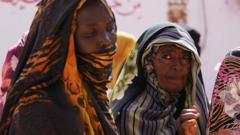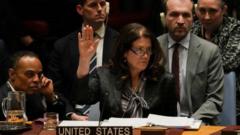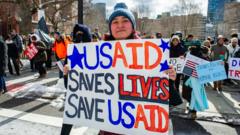Nearly 80% of emergency food kitchens in Sudan have closed due to the freezing of US aid, intensifying the humanitarian crisis amidst ongoing conflict. Local activists face challenges in sustaining support for millions at risk of starvation, while the international community grapples with the implications of funding changes.
US Aid Cuts Bring Dire Consequences for Sudanese Families Facing Hunger

US Aid Cuts Bring Dire Consequences for Sudanese Families Facing Hunger
The halting of US humanitarian assistance significantly impacts food aid, exacerbating the hunger crisis in Sudan and contributing to rising refugee numbers as communities struggle to survive.
The freezing of US humanitarian assistance has forced the closure of nearly 80% of emergency food kitchens in Sudan, leaving millions vulnerable amid escalating conflict and hunger. Aid volunteers reported that over 1,100 communal kitchens, which were crucial for those affected by Sudan's civil war, have shut down following President Donald Trump's executive order halting contributions from USAID for three months. This decision has far-reaching consequences with around two million people estimated to be affected.
Since the civil war erupted in April 2023 between the army and the paramilitary Rapid Support Forces, the humanitarian situation has deteriorated drastically. The conflict has resulted in tens of thousands of deaths and has displaced millions, compounding fears of famine. Community kitchens, run by grassroots organizations, have provided vital support, yet they are now facing an uncertain future.
Duaa Tariq, an organizer of emergency kitchens, highlighted the desperation among locals as many knock on volunteers’ doors pleading for food. Although the State Department issued a waiver for emergency food assistance, the lack of clarity regarding the reinstatement of cash aid means that support may not reach the kitchens effectively. USAID had previously funded a significant portion of the cash programs essential for sustaining food supply efforts, which are now at risk.
Experts, including former USAID officials, warn that the aid suspension constitutes a “huge setback” for addressing the hunger crisis in Sudan. The Mutual Aid Sudan Coalition, initiated by Andrea Tracy, aims to bridge the funding gap through private donations, yet the reality remains bleak as local activists struggle with inadequate resources amid worsening conditions.
The impact of US aid cuts and subsequent policy shifts is felt not only in Sudan but extends to neighboring countries where the influx of refugees from Sudanese communities puts added strain on already limited resources. The UN estimates that over two million Sudanese civilians have sought refuge in neighboring nations, such as South Sudan, where the humanitarian situation is precarious.
UN officials describe the overwhelming challenges faced by refugees, with many experiencing severe malnutrition and limited access to food and safety. As the ongoing conflict persists without signs of resolution, closures of emergency feeding centers signify a growing crisis that worsens conditions for returning refugees to their homeland.
International aid organizations are now finding it increasingly difficult to meet the rising demand for assistance, with calls for contributions falling short of targets. The UNHCR reports operating at minimal intervention levels, emphasizing the urgent need for restored funding to sustain life-saving programs and prevent further human suffering.
As Sudan’s humanitarian outlook darkens, immediate and significant changes in foreign aid policy will be critical in addressing the dire needs of those affected by conflict and hunger, not only in Sudan but across the broader region.
Since the civil war erupted in April 2023 between the army and the paramilitary Rapid Support Forces, the humanitarian situation has deteriorated drastically. The conflict has resulted in tens of thousands of deaths and has displaced millions, compounding fears of famine. Community kitchens, run by grassroots organizations, have provided vital support, yet they are now facing an uncertain future.
Duaa Tariq, an organizer of emergency kitchens, highlighted the desperation among locals as many knock on volunteers’ doors pleading for food. Although the State Department issued a waiver for emergency food assistance, the lack of clarity regarding the reinstatement of cash aid means that support may not reach the kitchens effectively. USAID had previously funded a significant portion of the cash programs essential for sustaining food supply efforts, which are now at risk.
Experts, including former USAID officials, warn that the aid suspension constitutes a “huge setback” for addressing the hunger crisis in Sudan. The Mutual Aid Sudan Coalition, initiated by Andrea Tracy, aims to bridge the funding gap through private donations, yet the reality remains bleak as local activists struggle with inadequate resources amid worsening conditions.
The impact of US aid cuts and subsequent policy shifts is felt not only in Sudan but extends to neighboring countries where the influx of refugees from Sudanese communities puts added strain on already limited resources. The UN estimates that over two million Sudanese civilians have sought refuge in neighboring nations, such as South Sudan, where the humanitarian situation is precarious.
UN officials describe the overwhelming challenges faced by refugees, with many experiencing severe malnutrition and limited access to food and safety. As the ongoing conflict persists without signs of resolution, closures of emergency feeding centers signify a growing crisis that worsens conditions for returning refugees to their homeland.
International aid organizations are now finding it increasingly difficult to meet the rising demand for assistance, with calls for contributions falling short of targets. The UNHCR reports operating at minimal intervention levels, emphasizing the urgent need for restored funding to sustain life-saving programs and prevent further human suffering.
As Sudan’s humanitarian outlook darkens, immediate and significant changes in foreign aid policy will be critical in addressing the dire needs of those affected by conflict and hunger, not only in Sudan but across the broader region.




















